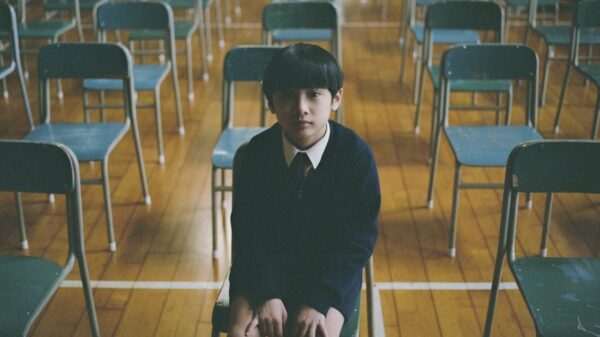Staff Writer Anwesh Banerjee reviews All Of Us Strangers, Andrew Haigh’s latest feature starring Andrew Scott and Paul Mescal, now playing in theatres near you.
Andrew Haigh as an artiste is not new to the genre of indie cinema that has always sought to explore, with adequate restraint and melancholy, the lives of ordinary people, mostly queer, fraught with loneliness. His feature debut Weekend (2011), is by far one of my favourite films about modern day relationships between queer men. A topic he revisited with a broader expanse and deeper concerns in his HBO-backed, two-season-long series Looking (2014-2016). Haigh’s protagonists are always people we see on the screen before us, over a shockingly small span of real time over which they struggle to combat forces and secrets of the past, and the consequences of being confronted with the burden of a life lived under duress. His latest feature, All Of Us Strangers, is no different.
The opening credits roll over a starkly still and modertately long sequence that invites the viewer to look at the city of London. We see the sun rise over the city – a space that is at once thriving with the life of a million souls and yet equally throbbing with the weight of the loneliness they all carry within. As the sequence proceeds we realise our vision is mediated through the existence of a glass screen, one that comes into focus as our film’s protagonist Adam (played by a devastating Andrew Scott) comes to stand still before the glass. As his reflection comes into focus, we see his face mapped over the cityscape. You realise the film’s central occupation with Adam’s place in this bustling metropolis as he navigates questions of identity, place and belonging.
Despite the loneliness, Adam isn’t particularly alone (you might be tempted to question the merit of this deeply basic observation but hang on, I have a point and so does the film). One evening, a stranger, and what seems like the sole occupant of the seventh floor of the building Adam lives in, comes knocking on his door – a bottle of Japanese whiskey in his hand for company. Harry (played by the roguishly charming Paul Mescal) walks into Adam’s life, and while the latter is initially hesitant the two end up forming a bond that over the course of the film comes to mean something deeper and more significant than your regular, metropolitan gay hookups. One might be tempted to ask, and rightfully so, what it is exactly that holds Adam back. After all, if someone with the looks, charm and smile of Paul Mescal were to walk into your apartment one fine evening, why would you under any circumstance hold yourself back? As it turns out, Adam lost his parents in a tragic car crash in his early childhood. A site he keeps revisiting over the course of the film, in an attempt to connect with the ghosts (quite literally) of his past in order to make sense of his present sense of loss and lack of belonging.
The parents, played to restrained perfection by Jamie Bell and Claire Foy, cook for Adam, converse with him about his life and finally offer him a chance to come out to them – something Adam never got the chance to do, during their shared life. This desire, rather almost pathological need, for Adam to truly be his own self before his parents as an almost causal need to find his own bearings as a grown man is what forms the emotional crux of the film. Scene after scene Haigh, who also adapts his screenplay from Taichi Yamada’s 1987 novel called Strangers, puts before us scenes imbued with lived-in reality that on many occasions I found myself weeping not because of the pain that Adam goes through; but rather the pain of my own lived-in queerness being reflected on celluloid before me.

In the past years, there have been multiple conversations about the representation of queerness in cinema. Most of these conversations have now gone past beyond the trappings of queer creators and performers inhabiting stories of queerness and entered the realm of what it is that truly amounts to queer representation when one chooses to depict the queer on-screen. From an era in our cinema, where stories of queerness were always coloured with varied shades of violence (precipipated by decades of stigma in the wake of the AIDs crisis and the criminalisation of queer lives and bodies across major nation states), we as an audience have finally come to begin demanding stories of queer joy out of our creators. Stories that do not end on a note of pain or sadness because to straightjacket the experience of an entire human community along the contours of violence, is to deny the possibility of celebrating the sheer joy that is to be had from the bearings of a minority identity. In that regard, series like Netflix’s Heartstopper and Amazon Prime’s Red, White and Royal Blue have been universally acclaimed for finally bringing to the fore stories that are reaffirming and hopeful, and which briefly convince us viewers that queer people can too have a fairy tale ending.
All Of Us Strangers straddles both these representational verticals. On one hand he depicts the unexplainable need to come out to our parents and on the other he also drives home, and successfully so, the point that the making of our queerness is eventually in our hands. Adam’s letting go of his parents is as much an exercise in processing the grief of losing loved ones, as it is a lesson in coming to terms with loving your own self. In doing so, Haigh’s biggest feat lies in his unpacking of the trauma that comes with the malady I prefer calling as urban loneliness. Adam and Harry are both handsome, arguably hunk-ish men, who live in one of the most desirable cities in the world. They are financially comfortable, attend queer clubs and spaces and seem to have a sex life that is enviable. Yet there is a sense of alienation in both their characters that drives their eventual search for intimacy and connection in the big city.
Scott and Mescal perform some of the most tender scenes of love-making I have seen in the past year. If Paramount’s Fellow Travellers was a masterclass in exploring the shifting power dynamics of a relationship through the recurrent motif of sex, All Of Us Strangers is a fitting counter-piece that shows the almost visceral, often mystical, quality of the act. The way the lover’s approach each other’s bodies (their first time together is an obvious homage to one of the first sex scenes of Weekend which also awkwardly plays out on the protagonist’s couch) — masks a hunger, not for the flesh but for the soul. It is a hunger that is reminiscent of Olivia Lang’s famous description of loneliness as a ravishing hunger that consumes the body, in her seminal book The Lonely City. It is this loneliness that drives the both the characters in the film – only to make them realise that what they are truly searching for is a semblance of familiarity in their own strange selves. There is a melancholia in the eyes of Scott that can only come from years of living life as a queer man, and he is absolutely brilliant in his portrayal of Adam. Be it in the scene where he smiles his way through a coming-out conversation with his mother who has a rather matter-of-fact approach to the subject; or his father where his smile is no longer one of amusement. It is one that shows unwilling acceptance of a condition that has always been beyond his grasp of change.
But that is not to say that the film is without its flaws. Despite the overwhelmingly emotional nature of the screenplay, the writing can seem too sentimental in patches. For people who are used to seeing Haigh’s previous works, which have been characterised by an expression of bizarre situation cruelty, All Of Us Strangers is bound to appear like a more tepid film. It does not have the raw mumblecore quality of Weekend, or the absurd psychological violence of 45 Years, or the slice-of-lilfe humour of Looking. Its reliance on spectral presences might be deemed as derivative, sometimes outright exploitative, and for people like me who have grown up on M. Night. Shyamalan’s works – you will see the final twist coming pretty much half an hour into the film.
However, the sentimentality notwithstanding, All Of Us Strangers has its heart in the right place. And what a heavy heart that is! And over the course of one and a half hours, it becomes one of the most profound and melancholic meditations that I have encountered in cinema on what it means to come to terms with loss while being lost yourself.
















